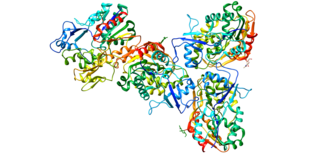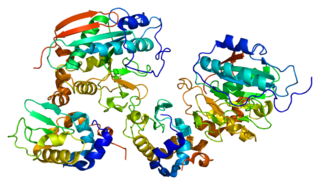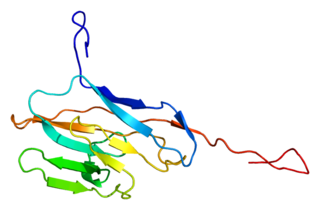Related Research Articles

Lecithin–cholesterol acyltransferase is an enzyme, in many animals including humans, that converts free cholesterol into cholesteryl ester, which is then sequestered into the core of a lipoprotein particle, eventually making the newly synthesized HDL spherical and forcing the reaction to become unidirectional since the particles are removed from the surface. The enzyme is bound to high-density lipoproteins (HDLs) (alpha-LCAT) and LDLs (beta-LCAT) in the blood plasma. LCAT deficiency can cause impaired vision due to cholesterol corneal opacities, anemia, and kidney damage. It belongs to the family of phospholipid:diacylglycerol acyltransferases.

Cathepsin A is an enzyme that is classified both as a cathepsin and a carboxypeptidase. In humans, it is encoded by the CTSA gene.

Prosaposin, also known as PSAP, is a protein which in humans is encoded by the PSAP gene.

Beta-galactoside alpha-2,6-sialyltransferase 1 is an enzyme that in humans is encoded by the ST6GAL1 gene.

Carcinoembryonic antigen-related cell adhesion molecule 1 (CEACAM1) also known as CD66a, is a human glycoprotein, and a member of the carcinoembryonic antigen (CEA) gene family.

Carcinoembryonic antigen-related cell adhesion molecule 6 (CEACAM6) also known as CD66c, is a member of the carcinoembryonic antigen (CEA) gene family..

Beta-1,4-galactosyltransferase 1 is an enzyme that in humans is encoded by the B4GALT1 gene.

Beta-microseminoprotein is a protein that in humans is encoded by the MSMB gene. For historical reasons, the scientific literature may also refer to this protein as Prostate secretory protein 94 (PSP94), microseminoprotein (MSP), microseminoprotein-beta (MSMB), beta-inhibitin, prostatic inhibin peptide (PIP), and inhibitin like material (ILM).

Pregnancy-specific beta-1-glycoprotein 1 (PSBG-1) also known as CD66f, is a protein that in humans is encoded by the PSG1 gene and is a member of the carcinoembryonic antigen (CEA) gene family. Pregnancy-specific glycoproteins (PSGs) are a complex consisting of carbohydrate and protein, which is present in the mammalian body specifically during pregnancy. This glycoprotein is the most abundant protein found in the maternal bloodstream during the later stages of pregnancy and it is of vital importance in fetal development. The PSG functions primarily as an immunomodulator to protect the growing fetus.

Alpha-N-acetylgalactosaminidase is an enzyme that in humans is encoded by the NAGA gene.

Pregnancy-specific beta-1-glycoprotein 9 is a protein that in humans is encoded by the PSG9 gene.

Carcinoembryonic antigen-related cell adhesion molecule 3 (CEACAM3) also known as CD66d, is a member of the carcinoembryonic antigen (CEA) gene family..

Pregnancy-specific beta-1-glycoprotein 3 is a protein that in humans is encoded by the PSG3 gene.

Carcinoembryonic antigen-related cell adhesion molecule 8 (CEACAM8) also known as CD66b, is a member of the carcinoembryonic antigen (CEA) gene family. Its main function is cell adhesion, cell migration, and pathogen binding.

Pregnancy-specific beta-1-glycoprotein 5 is a protein that in humans is encoded by the PSG5 gene.

Carcinoembryonic antigen-related cell adhesion molecule 7 is a protein that in humans is encoded by the CEACAM7 gene.

Pregnancy-specific beta-1-glycoprotein 4 is a protein that in humans is encoded by the PSG4 gene.

Pregnancy-specific beta-1-glycoprotein 6 is a protein that in humans is encoded by the PSG6 gene.

Carcinoembryonic antigen-related cell adhesion molecule 5 (CEACAM5) also known as CD66e, is a member of the carcinoembryonic antigen (CEA) gene family.
References
- ↑ "Human PubMed Reference:". National Center for Biotechnology Information, U.S. National Library of Medicine.
- ↑ Khan WN, Teglund S, Bremer K, Hammarstrom S (May 1992). "The pregnancy-specific glycoprotein family of the immunoglobulin superfamily: identification of new members and estimation of family size". Genomics. 12 (4): 780–7. doi:10.1016/0888-7543(92)90309-G. PMID 1572651.
- ↑ "Entrez Gene: LOC653492 similar to Pregnancy-specific beta-1-glycoprotein 8 precursor (PSBG-8)".